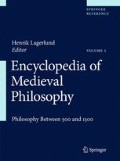Abstract
In the medieval sense of the word, a sophism is a problematic sentence that is discussed in a technical manner, usually including a solution showing how the apparent problems arise. Sophisms were used from the twelfth century onward as exercises for student in their first years of university studies, but at least in the fourteenth century sophisms were also used for purposes more accurately described as research. The problems with single sentences were for the most part logical or linguistic, but also many issues of natural philosophy were addressed as sophisms. Collections of sophisms may have circulated as exercise books but in the mature form of the genre established authors wrote their own collections, since the solutions provided an efficient context for presenting philosophical doctrine.
Bibliography
Primary Sources
Heytesbury W (1984) On maxima and minima: chapter 5 of rules for solving sophismata, with an anonymous fourteenth-century discussion, trans. with introduction and study by Longeway J. D. Reidel, Dordrecht
Hughes GE (1982) John Buridan on self-reference. Chapter eight of Buridan’s ‘Sophismata’. An edition and a translation with an introduction and a philosophical commentary. Cambridge University Press, Cambridge (The paperbound edition omits the Latin text)
Kretzmann N, Kretzmann BE (1990a) The ‘Sophismata’ of Richard Kilvington, critical edn. Oxford University Press for the British Academy, Oxford
Kretzmann N, Kretzmann BE (1990b) The ‘Sophismata’ of Richard Kilvington. Cambridge University Press, Cambridge (English translation, historical introduction and philosophical commentary)
Secondary Sources
Biard J (1989) Les sophismes du savoir: Albert de Saxe entre Jean Buridan et Guillaume Heytesbury. Vivarium 27:36–50
Ebbesen S (1979) The dead man is alive. Synthese 40:43–70
Lewry PO (ed) (1985) The rise of British logic: acts of the sixth European symposium on medieval logic and semantics. Papers in medieval studies 7. Pontifical Institute of Medieval Studies, Toronto
Pinborg J (1976) Magister Abstractionum. Cahiers de l’Institut du Moyen-Âge Grec et Latin 18:1–4. Copenhague
Read S (ed) (1993) Sophisms in medieval logic and grammar, acts of the 8th European symposium for medieval logic and semantics. Kluwer, Dordrecht
Rosier I (1991) Les sophismes grammaticaux au XIIIe s. Medioevo 17:175–230
Wilson C (1960) William Heytesbury: medieval logic and the rise of modern physics. The University of Wisconsin Press, Madison
Author information
Authors and Affiliations
Editor information
Editors and Affiliations
Rights and permissions
Copyright information
© 2011 Springer Science+Business Media B.V.
About this entry
Cite this entry
Yrjönsuuri, M. (2011). Sophisms. In: Lagerlund, H. (eds) Encyclopedia of Medieval Philosophy. Springer, Dordrecht. https://doi.org/10.1007/978-1-4020-9729-4_469
Download citation
DOI: https://doi.org/10.1007/978-1-4020-9729-4_469
Publisher Name: Springer, Dordrecht
Print ISBN: 978-1-4020-9728-7
Online ISBN: 978-1-4020-9729-4
eBook Packages: Humanities, Social Sciences and Law

